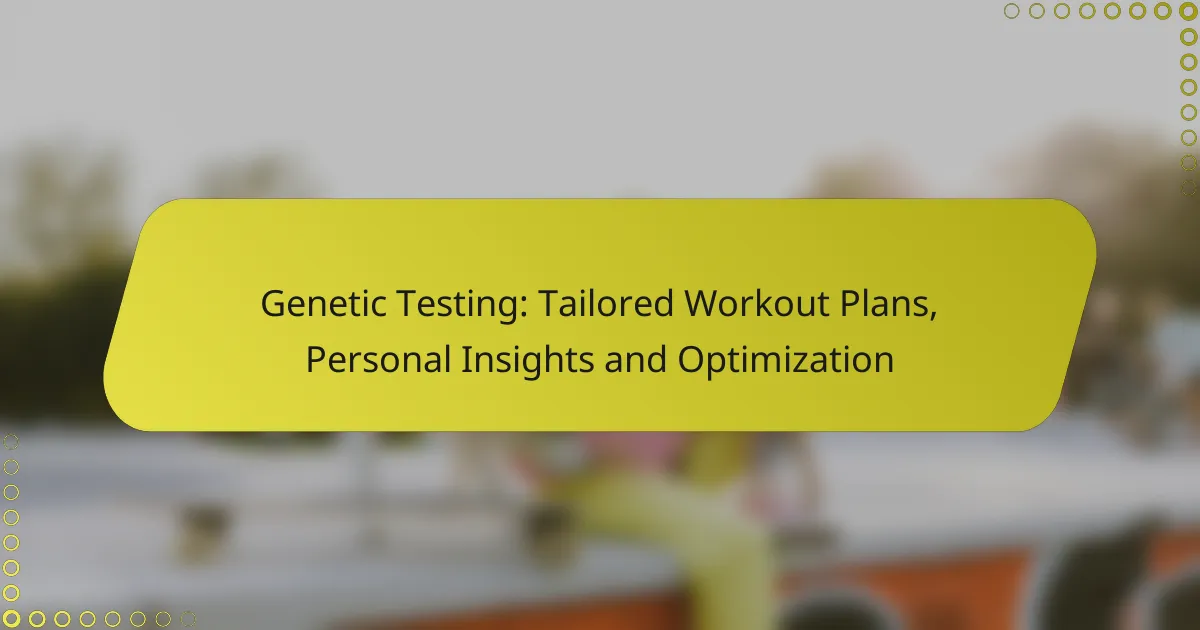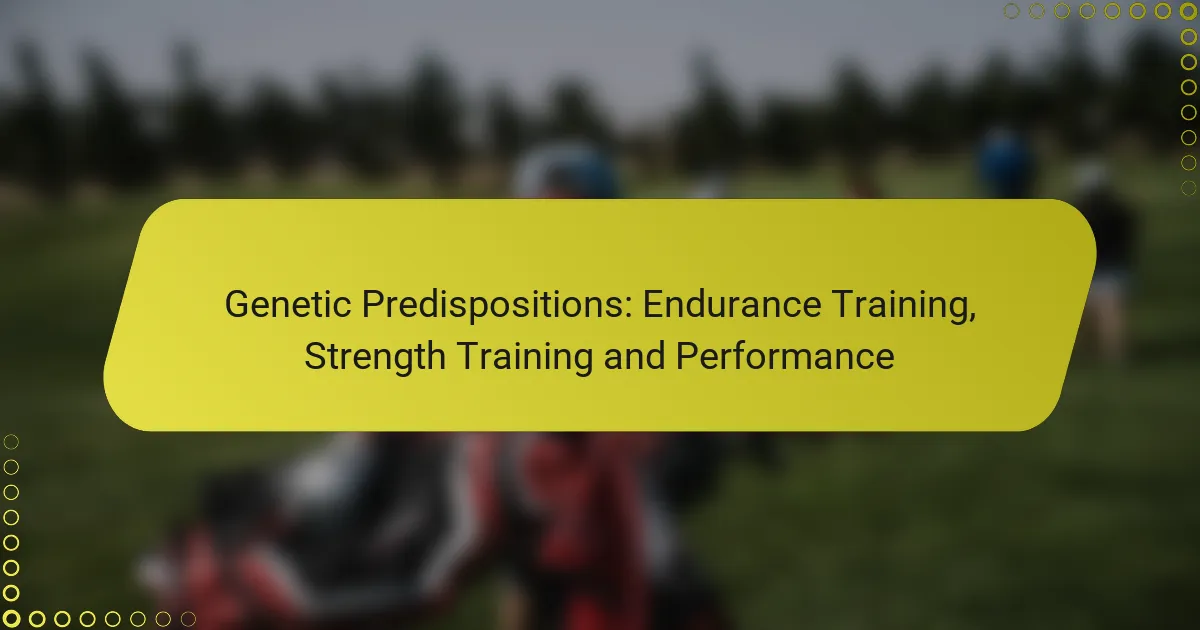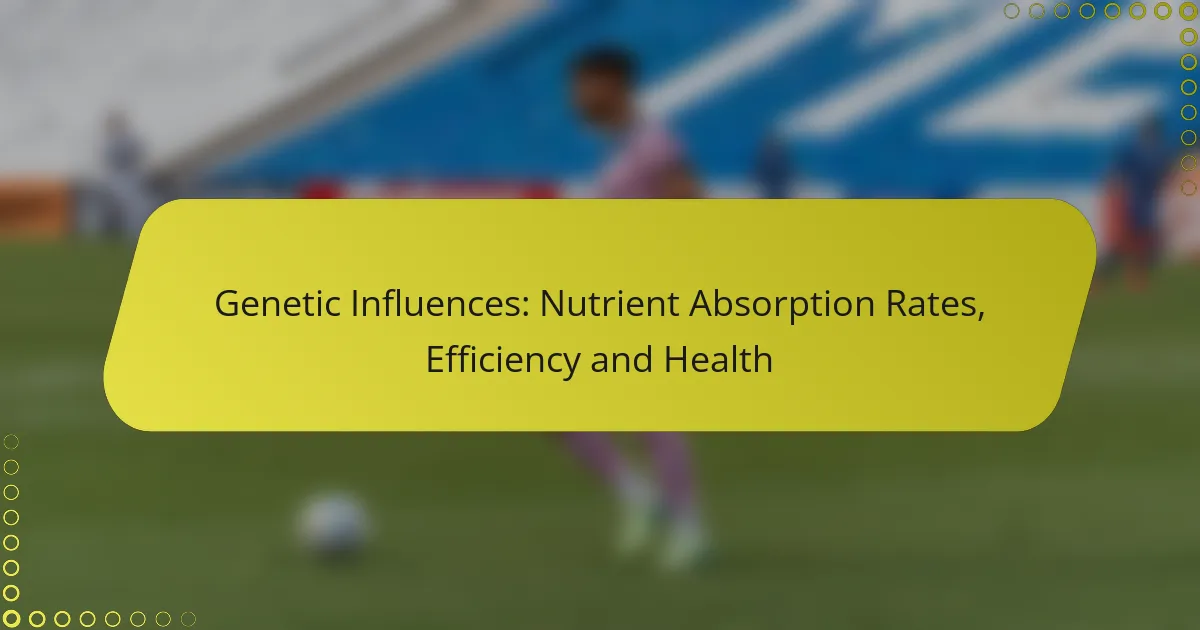Genetic testing offers a powerful tool for optimizing workout plans by revealing how individuals uniquely respond to exercise and nutrition. By leveraging insights into genetic predispositions, personalized fitness strategies can be developed, enhancing training effectiveness and reducing injury risk. With options like 23andMe, DNAfit, and MyHeritage DNA, individuals can access valuable information to tailor their fitness routines for improved performance and health.

How Can Genetic Testing Improve Workout Plans?
Genetic testing can significantly enhance workout plans by providing insights into individual responses to exercise and nutrition. By understanding genetic predispositions, individuals can tailor their fitness routines to maximize effectiveness and minimize injury risk.
Personalized fitness recommendations
Genetic testing can reveal how your body responds to different types of exercise, such as endurance versus strength training. For example, some individuals may have a genetic predisposition for better performance in aerobic activities, while others may excel in high-intensity workouts. Tailoring your fitness regimen based on these insights can lead to more efficient training and improved results.
Consider working with a fitness professional who understands genetic testing to create a customized workout plan. This plan should align with your genetic strengths and weaknesses, ensuring that you engage in activities that suit your unique profile.
Enhanced recovery strategies
Understanding your genetic makeup can also inform recovery strategies, helping you to optimize rest and rehabilitation. Certain genes influence muscle recovery time and susceptibility to injuries, allowing you to adjust your recovery protocols accordingly. For instance, if your genetic profile indicates slower recovery, you might prioritize longer rest periods or incorporate more active recovery days into your routine.
Implementing recovery techniques such as foam rolling, stretching, and adequate sleep can be tailored based on your genetic insights. This personalized approach can help prevent overtraining and enhance overall performance.
Optimized nutrition plans
Genetic testing can guide you in creating a nutrition plan that complements your workout regimen. Certain genetic markers can indicate how well your body metabolizes carbohydrates, fats, and proteins, allowing you to adjust your macronutrient intake for better energy levels and performance. For example, individuals with a higher carbohydrate sensitivity may benefit from a lower-carb diet to enhance endurance.
Incorporating foods that align with your genetic predispositions can also improve recovery and overall health. Consider consulting a nutritionist familiar with genetic insights to develop a meal plan that supports your fitness goals and enhances your workout effectiveness.

What Are the Benefits of Tailored Workout Plans?
Tailored workout plans provide personalized fitness strategies that align with individual genetic profiles, leading to more effective training outcomes. By considering factors such as metabolism, muscle composition, and recovery rates, these plans enhance overall performance and health.
Increased workout efficiency
Tailored workout plans maximize efficiency by aligning exercises with an individual’s unique genetic makeup. For instance, someone with a predisposition for endurance may benefit from longer, moderate-intensity workouts, while a person with a strength-oriented genetic profile might excel with shorter, high-intensity sessions.
To ensure efficiency, track your progress and adjust your routine based on results. Regular assessments can help identify which types of workouts yield the best outcomes, allowing for continuous optimization.
Reduced injury risk
Personalized workout plans can significantly lower the risk of injuries by incorporating exercises that suit an individual’s physical capabilities and limitations. By understanding genetic predispositions to certain injuries, such as joint issues or muscle strains, workouts can be designed to minimize stress on vulnerable areas.
Consider including a balanced mix of strength, flexibility, and conditioning exercises to support overall body resilience. Always listen to your body and modify or rest when necessary to prevent overtraining and injuries.
Improved motivation and adherence
When workout plans are tailored to individual preferences and strengths, motivation and adherence to the program tend to increase. Personalized plans often incorporate enjoyable activities and achievable goals, making it easier to stay committed to fitness routines.
To enhance motivation, set specific, measurable, achievable, relevant, and time-bound (SMART) goals. Regularly revisiting and adjusting these goals can keep your fitness journey engaging and aligned with your evolving interests and capabilities.

Which Genetic Tests Are Best for Fitness Insights?
Several genetic tests can provide valuable fitness insights, helping individuals tailor their workout plans based on their genetic predispositions. The best options include 23andMe, DNAfit, and MyHeritage DNA, each offering unique features and benefits for fitness optimization.
23andMe
23andMe is a popular genetic testing service that offers insights into various health and fitness traits. It analyzes genetic variants related to muscle composition, exercise recovery, and endurance, allowing users to understand their natural strengths and weaknesses.
When using 23andMe for fitness insights, consider its comprehensive health reports, which can guide your workout choices. For example, if you have a genetic predisposition for power over endurance, you might focus more on strength training rather than long-distance running.
DNAfit
DNAfit specializes in fitness and nutrition insights based on genetic analysis. This service provides personalized workout plans and dietary recommendations tailored to your genetic profile, helping you optimize your training and nutrition strategies.
With DNAfit, you receive specific recommendations such as the ideal types of exercise (aerobic vs. anaerobic) and recovery strategies. For instance, if your results indicate a higher risk for injury, you may want to incorporate more flexibility and strength training into your routine.
MyHeritage DNA
MyHeritage DNA primarily focuses on ancestry but also offers health reports that include fitness-related insights. While it may not be as specialized as 23andMe or DNAfit, it still provides valuable information about traits that can influence your fitness journey.
Using MyHeritage DNA, you can gain insights into your body’s response to exercise and recovery. This information can help you make informed decisions about your fitness regimen, such as adjusting workout intensity or frequency based on your genetic predispositions.

How to Choose a Genetic Testing Service?
Selecting a genetic testing service involves evaluating the features, pricing, and customer feedback to ensure it meets your specific needs. Consider what insights you want, such as fitness optimization or health risks, and how the service aligns with your goals.
Comparison of features
When comparing genetic testing services, focus on the specific features they offer. Look for services that provide tailored workout plans, nutritional insights, and health risk assessments. Some companies may also include ongoing support or access to fitness professionals.
It’s beneficial to check if the service uses advanced technologies like whole genome sequencing or targeted SNP analysis. This can impact the depth of information you receive and its applicability to your fitness regimen.
Pricing considerations
Pricing for genetic testing services can vary widely, typically ranging from around $100 to several hundred dollars. Basic tests may provide limited insights, while comprehensive packages that include personalized plans and consultations tend to be more expensive.
Consider any additional costs for follow-up consultations or premium features. Some services offer subscription models that can spread out costs but may lead to higher long-term expenses.
Customer reviews and testimonials
Reading customer reviews and testimonials is crucial for understanding the effectiveness and reliability of a genetic testing service. Look for feedback on the accuracy of results and the usefulness of the provided insights.
Pay attention to recurring themes in reviews, such as customer service quality and the clarity of reports. A service with consistently positive feedback is likely to provide a better overall experience.

What Are the Limitations of Genetic Testing for Fitness?
Genetic testing for fitness has several limitations that can impact its effectiveness. While it can provide insights into potential fitness traits, the results are not definitive and should be interpreted with caution.
Potential inaccuracies
Genetic tests can sometimes yield inaccurate results due to various factors, including the quality of the sample and the algorithms used for analysis. Variations in genes may not directly correlate with fitness outcomes, leading to misleading interpretations. For example, a test might suggest a predisposition to endurance, but actual performance can be influenced by training, nutrition, and environment.
Moreover, genetic testing often focuses on a limited number of genes, which may not capture the full complexity of how genetics influence fitness. This means that relying solely on genetic data can overlook other critical factors that contribute to physical performance.
Ethical considerations
Ethical concerns surrounding genetic testing for fitness include privacy issues and the potential for genetic discrimination. Individuals may worry about how their genetic information is used, shared, or stored, particularly in contexts like insurance or employment. Ensuring that genetic data is handled responsibly is crucial to maintaining trust in testing services.
Additionally, there are concerns about the commercialization of genetic testing, where companies may exaggerate the benefits of their tests to attract customers. Consumers should be cautious and seek reputable sources that provide clear, evidence-based information about the limitations and implications of genetic testing for fitness.



